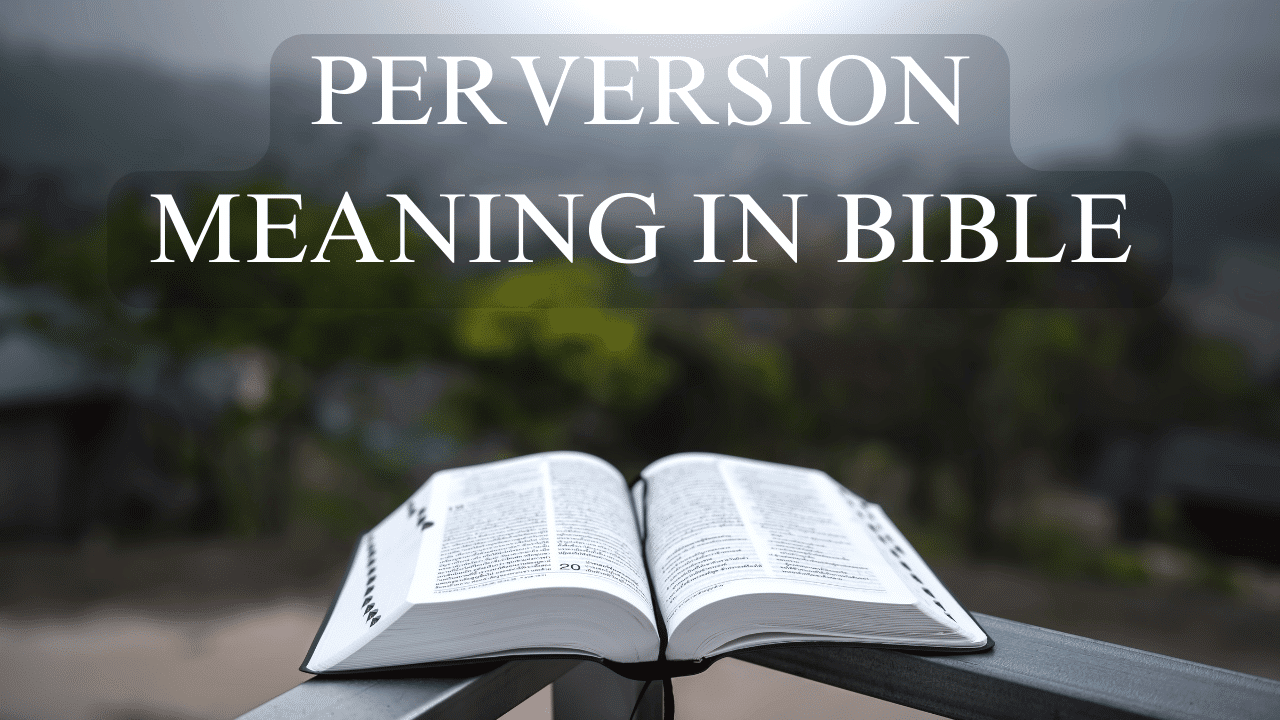Perversion in the Bible: Key Insights and Meanings
In the Bible, perversion often refers to moral or ethical corruption. Key insights include its association with deviating from God’s laws, engaging in immoral behaviour, and leading others astray. Perversion is frequently depicted as a serious violation of divine order and righteousness.
The concept of “perversion” in the Bible carries significant weight and complexity. It is often associated with behaviours and attitudes that deviate from the intended path of righteousness and holiness prescribed by God. Understanding what perversion means in the biblical context requires a deep dive into Scripture, where various terms and examples highlight the consequences of straying from God’s ways. Here, we will explore the meaning of perversion in the Bible, its implications, and key insights that can help us navigate our spiritual journey.
Defining Perversion in the Biblical Context
In the Bible, “perversion” is often understood as a departure from what is true, right, and just. It involves a distortion or corruption of God’s intended order and purpose for humanity. Perversion is not limited to sexual immorality but encompasses any form of deviation from God’s commandments and principles.
Hebrew and Greek Terms
Hebrew Terms:
- The Old Testament uses several Hebrew words to convey the idea of perversion. One of the key terms is “עָוֶל” (Avon), which is often translated as “iniquity” or “perversity.” It implies a moral distortion or deviation from the right path.
- Another term is “תָּעָה” (ta’ah), which means “to wander” or “to go astray.” It highlights the act of turning away from God’s guidance and truth.
Greek Terms:
- In the New Testament, the Greek word “διαστρέφω” (diastrepho) is used to describe perversion. It means “to distort” or “to twist,” emphasizing the alteration of truth and righteousness.
Broadening the Scope
While sexual immorality is a prominent form of perversion mentioned in the Bible, the term also applies to other areas of life where God’s principles are violated. This includes dishonesty, idolatry, greed, injustice, and other actions that go against God’s will.
Biblical Examples of Perversion
The Bible provides numerous examples of perversion, illustrating the consequences of turning away from God’s commands. These examples serve as warnings and lessons for believers to remain faithful and upright.
Sexual Perversion
Sodom and Gomorrah:
- The story of Sodom and Gomorrah in Genesis 19 is one of the most well-known examples of sexual perversion in the Bible. The cities were destroyed due to their inhabitants’ rampant immorality and disregard for God’s laws.
The Golden Calf:
- In Exodus 32, the Israelites created a golden calf to worship while Moses was on Mount Sinai. This act of idolatry and moral corruption exemplifies spiritual perversion and the consequences of turning away from God.
Perversion of Justice
Unjust Leaders:
- Throughout the Old Testament, there are instances where leaders pervert justice for personal gain. For example, in Isaiah 1:23, God condemns corrupt rulers who accept bribes and fail to defend the rights of the poor and needy.
John M. Johnson
Theologian
Perversion in the Bible is often a reflection of humanity’s struggle with moral boundaries, a reminder of the consequences when divine guidance is ignored.
False Prophets:
- In Jeremiah 23:16-17, God warns against false prophets who pervert His word and lead people astray with deceitful teachings. These prophets distort the truth for their benefit, leading others into error.
Consequences of Perversion in the Bible
The Bible makes it clear that perversion has serious consequences, both spiritually and physically. These consequences serve as a deterrent for those who might be tempted to stray from God’s path.
Spiritual Consequences
Separation from God:
- Perversion leads to a separation from God, as it involves a rejection of His commandments and guidance. Isaiah 59:2 states that iniquities create a barrier between individuals and God, hindering their relationship with Him.
Loss of Spiritual Blessings:
- Those who engage in perverse behaviour risk losing the spiritual blessings and protection that come from obedience to God. Proverbs 11:20 warns that the perverse heart is an abomination to the Lord, indicating a loss of favour and grace.
Physical Consequences
Destruction and Judgment:
- Throughout the Bible, we see examples of cities and individuals facing destruction and judgment as a result of their perversion. The story of Sodom and Gomorrah is a stark reminder of the physical consequences of moral corruption.
Suffering and Strife:
- Perversion often leads to suffering and strife, both personally and within communities. The breakdown of moral values can result in societal chaos and conflict, as seen in the Book of Judges when “everyone did what was right in his own eyes” (Judges 21:25).
Overcoming Perversion: Biblical Insights
The Bible offers guidance and hope for overcoming perversion and living a life aligned with God’s will. By understanding and applying these insights, believers can resist temptation and remain faithful to God’s commands.
Embracing Repentance and Forgiveness
The Power of Repentance:
- Repentance is a crucial step in overcoming perversion. It involves acknowledging one’s sins, seeking God’s forgiveness, and making a conscious decision to turn away from sinful behaviour. Acts 3:19 encourages believers to repent and turn to God for spiritual renewal.
God’s Forgiveness:
- The Bible assures us that God’s forgiveness is available to those who genuinely repent and seek His mercy. Psalm 103:12 reminds us that God removes our transgressions as far as the East is from the West, offering a fresh start for those who turn to Him.
Pursuing Righteousness and Holiness
Sarah L. Matthews
Theologian
The biblical narrative reveals that perversion distorts the divine order, challenging believers to discern and uphold the path of righteousness.
Living a Righteous Life:
- Pursuing righteousness involves aligning one’s actions and thoughts with God’s standards. This requires a commitment to living according to His commandments and seeking His guidance in all aspects of life.
The Role of the Holy Spirit:
- The Holy Spirit plays a vital role in helping believers overcome perversion and live a life of holiness. Galatians 5:16 encourages believers to walk by the Spirit, which empowers them to resist the desires of the flesh and live by God’s will.
Building a Strong Spiritual Foundation
Studying God’s Word:
- A deep understanding of God’s Word is essential for overcoming perversion and staying on the right path. Regular study and meditation on Scripture provide the knowledge and wisdom needed to make righteous choices.
Prayer and Fellowship:
- Maintaining a strong prayer life and engaging in fellowship with other believers can provide support and accountability in the journey toward righteousness. Hebrews 10:24-25 emphasizes the importance of encouraging one another and meeting together for spiritual growth.
Key Insights from Biblical Teachings
The Bible provides valuable insights into the nature of perversion and the importance of living a life that honours God. These teachings can guide believers in their quest for spiritual growth and righteousness.
The Importance of Discernment
Recognizing False Teachings:
- Discernment is crucial for identifying and avoiding false teachings that can lead to perversion. Believers are encouraged to test all things and hold fast to what is good (1 Thessalonians 5:21).
Avoiding Compromise:
- Compromise can lead to a gradual descent into perversion. Believers are called to stand firm in their faith and resist the temptation to conform to worldly values (Romans 12:2).
The Call to Holiness
Be Holy as God is Holy:
- The Bible calls believers to be holy, reflecting God’s character in their thoughts, words, and actions (1 Peter 1:15-16). This call to holiness requires a commitment to living a life set apart for God’s purposes.
The Example of Jesus:
- Jesus serves as the ultimate example of holiness and righteousness. By following His example and teachings, believers can overcome perversion and live a life that honours God.
The Role of Love and Grace
Mark A. Williams
Theologian
In the scriptures, perversion serves as a cautionary tale, illustrating the spiritual and societal decay that follows when God’s laws are twisted or neglected.
Loving Others:
- Love is a powerful antidote to perversion. By loving others as God loves us, believers can promote righteousness and reflect God’s character in their interactions with others (John 13:34-35).
Relying on God’s Grace:
- God’s grace provides the strength and support needed to overcome perversion and live a righteous life. Believers are encouraged to rely on His grace and seek His guidance in their spiritual journey (2 Corinthians 12:9).
FAQs About Perversion in the Bible
What does perversion mean in the Bible?
In the Bible, perversion refers to a deviation from what is true, right, and just. It involves a distortion or corruption of God’s intended order and purpose for humanity, encompassing behaviours and attitudes that violate His commandments.
How does the Bible address sexual perversion?
The Bible addresses sexual perversion by highlighting its consequences and urging believers to pursue purity and holiness. Passages such as 1 Corinthians 6:18-20 and Galatians 5:19-21 warn against sexual immorality and encourage believers to honour God with their bodies.
What are the spiritual consequences of perversion?
The spiritual consequences of perversion include separation from God, loss of spiritual blessings, and a hindrance in one’s relationship with Him. Perversion creates a barrier between individuals and God, preventing them from experiencing His presence and guidance.
How can believers overcome perversion?
Believers can overcome perversion by embracing repentance, seeking God’s forgiveness, and pursuing righteousness and holiness. Studying God’s Word, maintaining a strong prayer life, and relying on the Holy Spirit.








